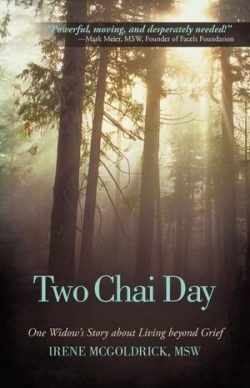Two Chai Day
One Widow's Story About Living Beyond Grief
People often do not know how to handle grief. In part, this may be due to the fact that many people try to rush through the grieving process. Two Chai Day will be valuable to a reader whose loved one has a devastating disease. It will let that person know that they are not alone in their feelings of frustration.
Irene McGoldrick, a social worker, has written a raw and moving account of her first husband’s battle with cancer that gets into the nitty-gritty details of how the disease affected her family. At times, it is hard to keep up with the names of friends and family, and the occasional jumps in chronology are a little confusing, but overall there is a surprising clarity to this memoir of grief and loss.
The book illustrates that there is a way to work through the struggles and pain of confronting cancer with a loved one, but it does not sugarcoat the enormous difficulties of the situation. When Bob was diagnosed with an aggressive form of cancer, he and McGoldrick, then thirty-six, were the parents of a young son and had a baby on the way. Their dreams and plans were shattered.
This is a very personal book; each chapter begins with a family photo and an inspirational quote. McGoldrick draws the reader in with a prologue in which her son declares that he wants his daddy back. In the first chapter, she recounts her family’s life for the year that followed Bob’s diagnosis with B-cell lymphoma. The author not only chronicles her own difficulties with this complex situation, she also includes excerpts from Bob’s journals, giving the reader a glimpse of his perspective.
At a specialized treatment center, Bob surprised the staff when he asks them about bike trails and where to buy organic food—things that were important to him before his diagnosis. The couple compiled this kind of information in a notebook that McGoldrick describes as “the place where hope met desire.” They also kept a binder full of information and instructions from the co-operative care program they chose, so Irene could assist in caring for Bob while he got a stem-cell transplant that they hoped would turn the tide. McGoldrick describes the binder as the place where “hope met reality.”
Bob used to make one cup of chai each day for McGoldrick, and she considered this to be an extravagance that she allowed herself to have. The day Bob passed away, a friend of the family made a cup of chai for McGoldrick; as she is wrapped in grief, gripping her empty coffee mug, the friend offers to make another cup, telling her it’s a “two-chai day.”
People who are going through an experience similar to McGoldrick’s journey with her first husband, or those who are trying to help someone who faces such a situation, would benefit from reading this very honest account.
Reviewed by
Jada Bradley
Disclosure: This article is not an endorsement, but a review. The publisher of this book provided free copies of the book and paid a small fee to have their book reviewed by a professional reviewer. Foreword Reviews and Clarion Reviews make no guarantee that the publisher will receive a positive review. Foreword Magazine, Inc. is disclosing this in accordance with the Federal Trade Commission’s 16 CFR, Part 255.

